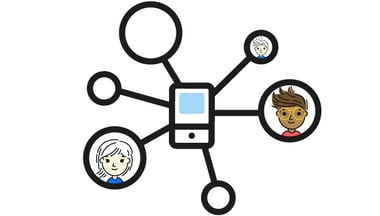In today’s technology-focused world, the possibility of cybersecurity threats against businesses and their customers is higher than ever before. With the frequency and cost of data breaches rising every year, it's becoming more and more important that companies find ways to protect themselves and their employees.Large and small businesses alike should prepare for potential breaches, because despite the common belief that cybercriminals only target big businesses, they actually target businesses of all sizes. Although big business attacks are more common, 60% of small businesses go out of business within six months of a cyberattack, making their protection even more imperative.
Are you at risk?
The most obvious targets for cybercriminals are unprotected and unprepared technological devices, which make businesses vulnerable to security breaches and hacks. A security breach could be detrimental to the longevity of a business’s success and the digital health of all its clients and employees, because it affects profits, brand reputation, and the ability to work. To protect your business, the first step is locking down these technological devices and keeping criminals out.
Getting Started with Cybersecurity
/Avoiding%20Agesim%20Staying%20Relevant%20in%20Tech%20Jobs.jpg?width=720&name=Avoiding%20Agesim%20Staying%20Relevant%20in%20Tech%20Jobs.jpg)
One of the most important things to do to keep your company safe is to learn what risks your employees are bound to face.
One of the biggest threats comes from email scams, so it's important to educate your employees on just what email scams and phishing are. While spam emails are easily detectable as unsolicited junk mail, phishing emails are more disguised and appear to come from well-known organizations you believe are trustworthy. Set general email rules in place to start — things like never opening attachments in emails from unconfirmed sources, getting an information technology professional involved if you’re feeling unsure, and refraining from responding to anything unreliable.
Another important thing to inform your employees of is the risk negligence poses for the security of the entire company. According to a report from Shred-it, an information security company, employee negligence and human error is the leading cause of data breaches in today’s working world. Human error not only includes malicious activity, but it also incorporates accidental loss of a device or document. Inform and educate your employees about human errors and what they should pay attention to in order to avoid these errors.
A few practices to suggest include...
- Locking and powering down devices when stepping away
- Never leaving devices unattended
- Restricting access to internal documents
- Setting up safety software on all company devices to keep hackers locked out
Below we’ve explored a few of these safety precautions in further detail to help increase your company’s digital security.
Ways to Increase Your Company’s Cyber Safety
/Data%20Protection%20Officer.jpg?width=720&name=Data%20Protection%20Officer.jpg)
- Install a Business-Class Network Security Appliance (NSA)
Having an NSA or firewall in place is like having a police officer at the gate of your network who can control all data entering and exiting the network. Firewall security provides many benefits, including monitoring traffic, blocking outside intruders, and stopping hackers from accessing sensitive information. Keep in mind that these benefits exclusively target outsiders — firewall security does not provide protection from those already inside the network. - Set Up Two-Factor Authentication
Utilize a two-factor authentication security process to help keep company and employee information locked down. The second step provides an extra layer of security to limit who can access your information since knowing only the password is not enough to gain access. Instead, those trying to get access will have to go through a second security checkpoint, such as a fingerprint scan or text confirmation, in order to successfully log in. This practice is a great way to prevent information from being stolen or accessed by uninvited parties. - Implement a Data Backup Strategy
Your organization should develop a backup and recovery plan for data on hardware before any sort of threat strikes. Implementing an automatic backup system that will save your sensitive data immediately is a great way to start. Don't have the budget for that? Back data up manually instead — assign one person to do so daily and reduce your risk of losing important documents. Be sure to also store a copy of all backed up information in the cloud or another external storage medium of your choosing. - Secure All Company Devices
In this day and age, chances are that your employees are using multiple devices for business every day. If this is the case, you’ll want to ensure all of these devices are in sync and have the same security measures in place. A simple way to align these security protocols is by purchasing a customized unified communications suite, technology company 8x8 recommends you select a partner that allows you to pick and choose what tools you want on all devices. From video conferencing and contact center solutions to instant messaging platforms or phone services, you can cover all of your business needs without paying for services you don't need. - Utilize Email Encryption
Because most correspondence between coworkers happens via email, it's important to protect your email in order to keep company data secure. Email encryption uses authentication mechanisms to prevent unauthorized personnel from accessing private company email messages. Most large-scale email platforms come equipped with built-in encryption, but that often isn’t enough to keep business emails containing classified information safe. As a backup, consider using multiple levels of encryption and require all employees, onsite and remote, to do the same. - Assign Administrator Accounts
Help keep information in the right hands by releasing access to a select group of employees, management, and executives. Carefully consider those whom you give access to control programming and settings on company accounts. It's crucial to reiterate to all employees the importance of changing their initial default passwords in order to make it difficult to hack into programs.
All of these precautions will give your executives the control necessary to ensure that classified company and employee information is protected and secure.
Don't forget: the most effective way to recover from a cyberattack is to prepare for one before it actually strikes!
About the Author
Katie Perkins is an employee of 8x8.



